DeLongTODAY: Enthusiastically Reading þe New Book by Mike Konczal: 'Freedom from þe Market'
Not really a book review, but highly moral-philosophy & book-relevant...
Over at: <http://delongtoday.com>
This is the DeLongTODAY Briefing. I am Brad DeLong, an economics professor at the University of California at Berkeley, and a sometime Deputy Assistant Secretary of the U.S. Treasury. This is the weekly DeLongToday briefing. Here I hold forth here on the Leigh Bureau’s vimeo platform on my guesses as to what I think you most need to know about what our economy is doing to us right now.
I promised Wes Neff when he agreed to provide the infrastructure for this that I and my briefings would be: lively, interesting, curious, thoughtful, and relatively brief.
Relatively.
I promised I would provide briefings on a mix of: forecasting, politics, macroeconomic analysis, history, and political economy.
Today is entirely a political economy, a moral philosophy, an intellectual history and orientation briefing. And it is also, sort of, a book review.
Mike Konczal of the Roosevelt Institute has a wonderful new book: Freedom from the Market <https://books.google.com/books?id=0aDLDwAAQBAJ> <https://tinyurl.com/dl-2021-02-18a>. What is it about? And why do I love it?
Let me start with what may seem to you to be—but is really not—a digression. Let me start with the moment in 1964 when the Republican Party went all-in against African-American hopes for voice, status, and a fairer share of America’s wealth: the 1964 presidential campaign of Arizona’s Barry Goldwater. As he ran for President, Goldwater was dead certain that the Republican Party should make no effort to win any African-American votes. “If you go hunting for ducks,” Goldwater said, “you go where the ducks are”. And there were no ducks in even making noises in support of African-American aspirations. Goldwater believed that Nixon had lost the election of 1960 because his running mate Henry Cabot Lodge’s prediction that Nixon would name an African-American to the cabinet, coupled with Nixon’s “change in language of the civil rights plank… it changed the sound of that and they didn’t like it”, had “curdled” Nixon’s chances in the south. Goldwater was not going to make that same mistake.
It was in that election that Supreme Court Chief Justice William Rehnquist won his spurs by running “ballot security” efforts in which “every Black or Mexican[-looking] person was being challenged.” Why did he do this?
[As] a deliberate effort to slow down the voting… to cause people waiting their turn to vote to grow tired.., and leave…. Handbills were distributed warning persons that if they were not properly qualified to vote they would be prosecuted…
And that effort never harmed Rehnquist one iota within the late-twentieth century Republican Party. Rather, it boosted him.
Up until 1901, twenty African-Americans had been elected to the U.S. House of Representatives. All of them had been Republicans. The last of them, George Henry White, left his office representing the 2nd District of North Carolina in 1901. As he left he said:
We have 32,000 teachers in the schools of the country; we have built, with the aid of our friends, about 20,000 churches, and support 7 colleges, 17 academies, 50 high schools, 5 law schools, 5 medical schools and 25 theological seminaries…. We have done it in the face of lynching, burning at the stake, with the humiliation of “Jim Crow” laws, the disfranchisement of our male citizens, slander and degradation of our women, with the factories closed against us, no Negro permitted to be conductor on the railway cars…no Negro permitted to run as engineer on a locomotive, most of the mines closed against us… With all these odds against us, we are forging our way ahead, slowly, perhaps, but surely… You may use our labor for two and a half centuries and then taunt us for our poverty, but let me remind you we will not always remain poor! You may withhold even the knowledge of how to read God’s word and…then taunt us for our ignorance, but we would remind you that there is plenty of room at the top, and we are climbing…!…. This, Mr. Chairman, is perhaps the Negroes’ temporary farewell to the American Congress; but…phoenix-like he will rise up some day and come again…
The next African-American to be elected was in 1929, and was, again, a Republican: Oscar Stanton De Priest, from the 1st District of Illinois, the seat now held by Bobby Rush. Congressman De Priest served until 1935, when he was replaced in his district by a Democratic African-American, Arthur W. Mitchell. (Then come 41 Democratic African-American congress members before the election of Republican Gary Franks from the 5th District of Connecticut in 1991.) Over 1936-1944 African-American registration was split equally between Democrats and Republicans. From 1948-1960 African-American voter registration was split 5-3 with the advantage to the Democratic Party.
The Democratic edge from 1948 to 1960 was… peculiar. The Democratic Party then had all the biggest racists in America, after all, and gave many of them very powerful positions as committee chairs in the U.S. Congress. A greater proportion of Republican than Democratic congress members were, after all, going to vote for Johnson’s Civil Rights Act—although, note, not the Voting Rights Act.
Truman’s Secretary of State Dean Acheson mused that the “apparent contradiction in the fact that the Southern racist belongs to the same political party as the New York supporter of the Fair Employment Practices Commission” was resolved by the fact that both saw themselves—were—getting a short end of the stick in the business-centered civilization of America. Nevertheless, the historical commitment of the Republican Party to African-American rights and uplift still had real bite, and if were offset in the 1950s by a superior Democratic commitment to lunchpail issues, to organization and mobilization, and to patronage, the growing number and proportion of African-American votes was a battleground Republicans should have been eager to contest.
But… not. Why did Goldwater decide to throw away that historical commitment—that founding principle of the Republican Party—in pursuit of voters whose deeply racist principles were antithetical to all that the Republican Party had stood for for more than a century. How did this make sense to him? And to Rehnquist? And to those who made Rehnquist first a justice and then chief justice of the United States government, and who still revere Goldwater?
The answer, I think, is that African-American aspirations—hopes for an equal voice, and then that with that equal voice they could ask and get a redistribution and redefinition of property to redress at least some of past injuries and abuses—made Goldwater and company extremely uneasy. They were asking for real democracy. And real democracy—especially African-American democracy—for Rehnquist and his compadres in Arizona’s Republican Party in 1964, and for many others as well, touched uncomfortably on matters of governance with respect to the market economy, and notions of the just and the fair and the equitable.
To make sense of this fear, let me now turn to two Vienna-born intellectuals: the Austrian-British-Chicagoan right-wing economist Friedrich August von Hayek (1899-1992), and the slightly-earlier Austro-Hungarian economist Karl Polanyi (1886-1964).
We first give the floor to von Hayek, who teacheth the lesson: “the market giveth, the market taketh away: blessed be the name of the market”.
Hayek always argued that to inquire whether a market economy’s distribution of income and wealth was “fair” or “just” was to commit a fatal intellectual blunder. “Justice” and “fairness” of any form requires that you receive what you deserve. But a market economy gives not to those who deserve but rather to those who happen to be in the right place at the right time. Who controls resources that are valuable for future production is not a matter of fairness. Once you step into the morass of “social justice,” Hayek believed, you would not be able to stop chasing a “just” and “fair” outcome “until the whole of society was organized… in all essential respects… [as] the opposite of a free society.”
Note that this did not mean you were morally obligated to watch the poor starve and the injured bleed out and die in the street. Society should make “some provision for those threatened by the extremes of indigence or starvation due to circumstances beyond their control” if only as the cheapest way to protect the hard-working and successful “against acts of desperation on the part of the needy.” And note that Hayek did not believe (much) in inherited feudal, guild, and customary blockages to decentralized market exchange. They should be steamed away. But beyond that you should not interfere with the market. The market was, or would lead us to, utopia—or as close to utopia as humans could attain. And in von Hayek’s eyes interference with the market was, as John Maynard Keynes snarked, “not merely inexpedient, but impious”.
That a market economy can produce a highly unequal distribution of income and wealth just as it can produce a less unequal distribution of income and wealth was beside the point. To even raise the question of what distribution of wealth should be made the presumption—false to Hayek—that people had rights other than property rights and obligations to others in addition to those they freely assumed through contract.
Besides, rectifying inequality was awful because it was chimerical. Hayek believed we lacked and would always lack the knowledge to create a better society. Centralization always led to misinformation and bad decisions. Top-down was a disaster. Only bottom-up “spontaneous orders” could possibly lead to progress. What humanity had was market capitalism, the only system that could possibly be even moderately efficient and productive, for “prices are an instrument of communication and guidance which embody more information than we directly have, [and so] the whole idea that you can bring about the same order based on the division of labor by simple direction falls to the ground”. Any attempts to reorder the market distribution of income in order to reward the deserving at the expense of the undeserving would erode market capitalism: “the idea [that] you can arrange for distributions of incomes… correspond[ing] to… merit or need” does not fit with your “need [for] prices, including the prices of labor, to direct people to go where they are needed.” And once you start planning you are on the Road to Serfdom: “the detailed scale of values which must guide the planning makes it impossible that it should be determined by anything like democratic means”. Hayek's was a “this-is-as-good-as-it-is-ever-going-to-get” sort of utopianism.
Accepting that this better organizing of society cared not a whit for the fair and the just, Hayek understood, was not likely to be done to universal huzzahs! That the only rights the market economy recognizes are property rights—and indeed only those property rights that are valuable—didn’t inspire the multitudes. The fact that the most valuable property rights are those useful in making things for which the rich have a serious jones made matters worse. It was clear that people thought they had other rights beyond those that accrued to the property they happened to hold. And this feeling posed an enormous problem for Friedrich von Hayek. He identified two substantive enemies to a good (or at least as good as it is likely to get) society: egalitarianism and permissiveness.
In a younger generation of libertarians, Milton Friedman would dismiss Hayek’s worries. Friedman was morally certain that most wealth was not and would never be inherited, and that most people were pretty much equal. Provide people with access to education and reward them for what contribution they made to production and you would have a middle-class society in which it did not matter much that rights accrued to property rather than to people. Voila: the overwhelming bulk of people would have a not-grossly-unfair share of the property.
So long as we train our gaze on white male Americans in and around the 1970s, their income distribution lent Friedman’s belief credence. Widen the pool of Americans, or look back on the more unequal distribution of 1900, or forward to that of today, and the sense of his position dissolves.
For the less pollyannish Hayek, however, democracy itself was a grave danger because it taught egalitarianism—that society should treat me as well as it treats you even though you have the property and thus the right to the market economy’s concern and solicitude. “‘Egalitarianism’ is,” Hayek wrote, “a product of the necessity under unlimited democracy to solicit the support even of the worst.” Poisonous to Hayek was democracy in Alexis de Tocqueville’s sense that mere luck made one master and the other valet—and luck might change tomorrow. “It is,” warned Hayek, “not by conceding ‘a right to equal concern and respect’ to those who break the code that civilization is maintained.”
The fearsome result would be permissiveness, which “assisted by a scientistic psychology, has come to the support of those who claim a share in the wealth of our society without submitting to the discipline to which it is due.” The lesson to learn was clear. A prosperous market economy could only flourish if it were protected from the tides of democracy and permissiveness.
Perhaps, indeed probably, for von Hayek societies would periodically need a Spartan Lykourgos, a Chilean General Augusto Pinochet. They would need someone to seize power and reorder society in an authoritarian mode that would respect the market economy. That the spilling of more than ink would be necessary to enforce such reordering was a regrettable consequence of this tarnished utopia.
Hayek, standing on the shoulders of giants and tyrants alike, articulated a position about the market economy that throughout the twentieth century generated a strong willingness on the political right to view democracy—political and social—not even as a lesser good but as a genuine evil. These forces did not lose strength as World War I came nearer.
Hayek he serves as a marker for a very powerful current of thought and action, powerful not least because it found itself congenial too and backed by very rich and powerful people. And it is true that the democratic political sphere can turn into one in which the logic is not cooperation and growth but rather confiscation and redistribution to the “deserving”, or even one of friends and enemies in which the logic is punishment for the “undeserving”. Hayek is not altogether wrong that keeping your head down, concentrating on win-win production for market exchange, and ignoring appeals to "social justice”—for “justice” involves not just treating equals equally but treating unequals unequally, and humans have not historically been very good at treating all others as of equal significance—as chimerical can be vastly better.
And Hayek was a far-sighted genius in one aspect. He did grasp most thoroughly and profoundly what the market system could do for human benefit. All societies in solving their economic problem face profound difficulties of getting reliable information to the deciders and then incentivizing the deciders to act for the public good. The market order of property, contract, and exchange can—if property rights can be arranged so that they are carved at the joints so that those principally affected by an action are at the table—pushes decision-making out to the decentralized periphery where the reliable information already is, thus solving the information problem, and by rewarding those who bring resources to valuable uses automatically solves the incentivization problem. (There remain the distribution problem, and many of the flaws in Hayek’s thinking come from his inability to recognize the nature of those problems at all. But absolutely nailing two out of three ain’t bad. Plus there is the macro-coordination problem, but that one is at a lower, more technical and technocratic level than the study of history and moral philosophy.)
On the other side, there is Karl Polanyi, who teacheth the lesson: “the market is made for man, not man for the market”.
Friedrich von Hayek loved that the market turned everything into a commodity, and feared those who thought it a fundamental strike against the market that it did not make everybody materially equal. Polanyi disagreed emphatically. In The Great Transformation, Polanyi explained that land, labor, and finance were “fictitious commodities,” They could not be governed by the logic of profit-and-loss but needed to be embedded in society and managed by the community, taking into account religious and moral dimensions. The result, Polanyi wrote, was a tension, a contest, a double movement. Ideologues of the market and the market itself attempted to dissembled land, labor, and finance from society’s moral and religious governance. In reaction, society struck back by restricting the domain of the market and putting its thumb on the scales where market outcomes seemed “unfair.”
As a consequence, a market society will face a backlash—it can be a left-wing backlash, it can be a right-wing backlash, but there will be a backlash—and it will be powerful.
Now these were—are—brilliant insights. As expressed by Polanyi in the original, they are also, sadly, incomprehensible to an overwhelming proportion of those who try to read him. With deference to comprehension, Polanyi can be summed as follows:
The market economy believes that the only rights that matter are property rights, and the only property rights that matter are those that produce things for which the rich have high demand. But people believe that they have other rights.
With respect to land, people believe that they have rights to a stable community. This includes the belief that the natural and built environment in which they grew up or that they made with their hands is theirs whether or not market logic says it would be more profitable if it were different—say a highway ran through it—or more lucrative if somebody else lived there.
With respect to labor, people believe that they have rights to a suitable income. After all, they prepared for their profession, played by the rules, and so society owes them a fair income, something commensurate with their preparation. And this holds whether or not the logic of the world market says otherwise.
With respect to finance, people believe that as long as they do their job of working diligently, the flow of purchasing power through the economy should be such as to give them the wherewithal to buy. And rootless cosmopolite financiers who may be thousands of miles away should have no commensurate right to decide that this or that flow of purchasing power through the economy is no longer sufficiently profitable, and so should be shut off. They should not be able to make your job dry up and blow away.
People have not just property rights, Polanyi declared, but these other economic rights. Which a pure market economy will not respect. It will lay down that highway, ignore years of preparation when doling out an income, and allow your purchasing power to dry up and blow away along with your job if someone thousands of miles away decides better returns on investments are to be found elsewhere. Hence society—by government decree or by mass action, left-wing or right-wing, for good or ill—will intervene, and re-embed the economy in its moral and religious logic so that these rights are satisfied.
Note that these rights that society will attempt to validate do not—or might not—be rights to anything like an equal distribution of the fruits of industry and agriculture. And it is probably wrong to describe them as fair: they are what people expect, given a certain social order. Equals should be treated equally, yes; but unequals should be treated unequally. And societies do not have to and almost never do presume that people are of equal significance.
And now we come back around to Mike Konczal, and his excellent new book. He takes a very Polanyian line, on how our freedom ought to be much more than freedom to buy or sell limited by the wealth and income that history and the market give us:
The things we need to lead our lives are forced into markets where we are compelled to obtain them, at the mercy of private, profitseeking actors and our own ability to pay…
That is not freedom, but is instead a form of compulsion:
When citizens declare that health care is a human right, they are making a stand against market dependency. In this view there are still markets. Doctors and nurses get salaries, MRI machines and bandages are purchased, and so on. But it also holds that individuals should not be dependent on the market as the sole determinant of what care they get. Health care should go to those who are sick, not those who are sick and who also happen to have money…
Konczal wants to reach into the past, for an American understanding that market dependency can be a source of unfreedom both when wealth is unequally and unfairly distributed and when individual market actors have too much market power and can charge unfair prices—“all the market will bear” is not a general principle. The rhetoric of the market is about how it is all voluntary exchange, and voluntary exchange is what people agree to, and so how can that be unfair? Adam Smith had an answer, with a piece of rhetorical judo in his Wealth of Nations. Suppose the market produced an equilibrium in which the great majority of the people were desperately poor and in want. What would we think of that? Smith’s answer:
What improves the circumstances of the greater part can never be regarded as an inconvenience to the whole. No society can surely be flourishing and happy, of which the far greater part of the members are poor and miserable. It is but equity, besides, that they who feed, clothe and lodge the whole body of the people, should have such a share of the produce of their own labour as to be themselves tolerably well fed, cloathed and lodged…
Focus on that “it is but equity”, besides. Fair—that is, voluntary—exchange can be unfair, and lead to an overall outcome that nobody would voluntarily accept under any definition of “voluntary” that excludes being under severe compulsion. Smith has been ambling along throughout the book, pointing out the extraordinary benefits of the market economy, and how it is an arena of freedom because people choose to undertake acts of economic exchange which are in accord with equity, as each trades what he or she values less for what he or she values more. And then he brings people up short, with this passage.
Konczal says that America has always agreed with Smith, and that it is only today that “glib libertarians” purveying “fantasies” are trying to make us forget “that free programs and keeping things free from the market are as American as apple pie…” One of the best passages in the book is where he notes the connection between the Fight for $15 minimum wage campaign and human freedom:
Service sector workers demanding a $15 minimum wage and a union… have already won huge victories [with] ideas about how low-wage, precarious work is a form of unfreedom…. The Rev. William Barber noted that ‘it took 400 years from slavery to now to get from zero to $7.25 [an hour]. We can’t wait another 400 years’ to get to $15…”
And as Henry Farrell says in his review of Mike Konczal, he turns the Hayekian system of thought against itself:
Hayek’s notion of spontaneous order is supposed to be evolutionary, to provide a more supple response to what people (thought of as individuals want). But if there is a need to provide collective goods for people that cannot be fulfilled through voluntarism, the Hayekian logic becomes a brutal constraint on adaptation…
Ultimately, if all you can say in response to the ills of society is “the market giveth, the market taketh away, blessed be the name of the market…” you have very little to say indeed. Konczal quotes Oliver Wendell Holmes’s fear and alarm that his fellow justices on the Lochner Supreme Court were, in their “willingness to use a very specific understanding of economics to override law, writ[ing] a preferential understanding of economics into the constitution itself…” in a fundamentally illegitimate and societally-disruptive way.
But a better maxim is: “The market was made for man, not man for the market”
I’m Brad DeLong. This is the DeLongTODAY Briefing. Thank you for watching.
Recorded 2021-02-18 4182 words 35:11 <https://www.icloud.com/pages/0qngUKWzJT3-FHnxHh2HH_M8w
<https://github.com/braddelong/public-files/blob/master/delongtoday-konczal-freedom-from-the-market-2021-02-18.pdf>


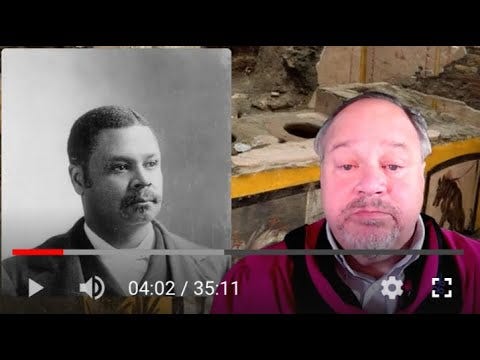


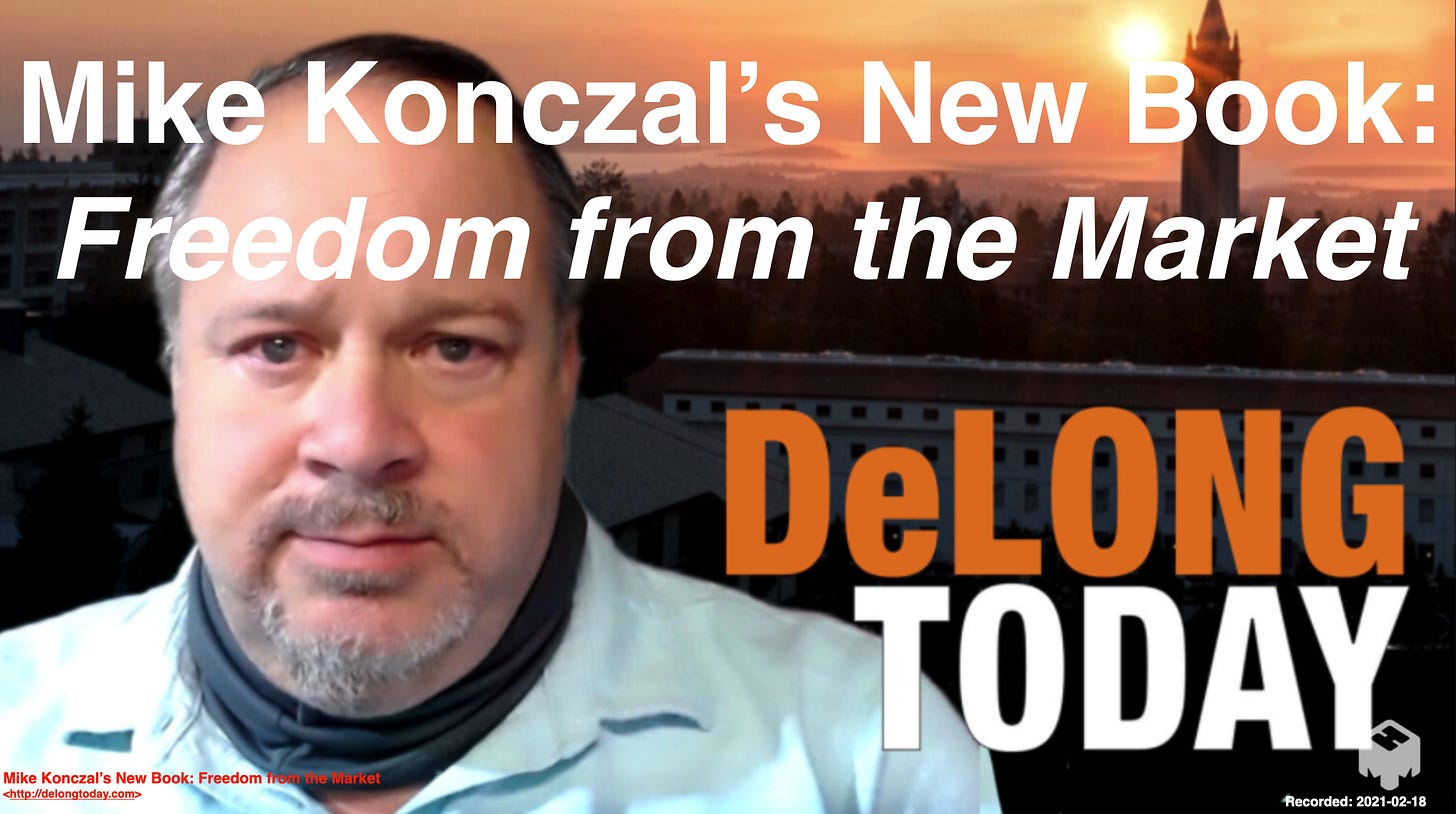
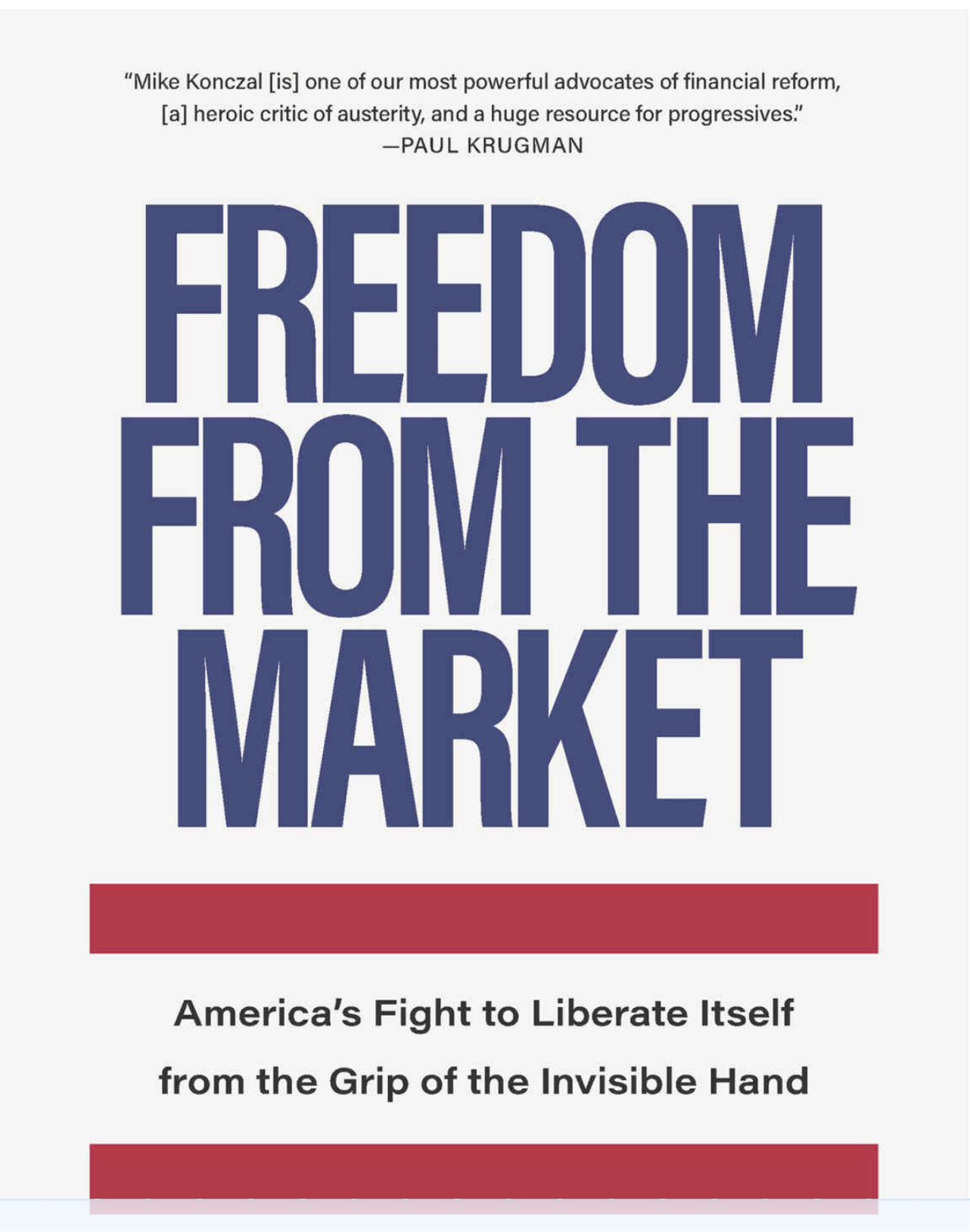
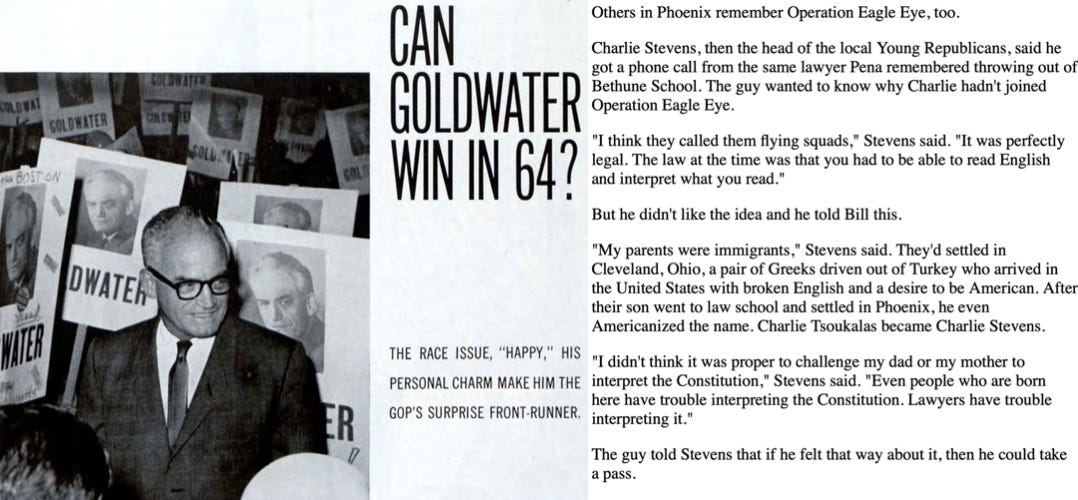


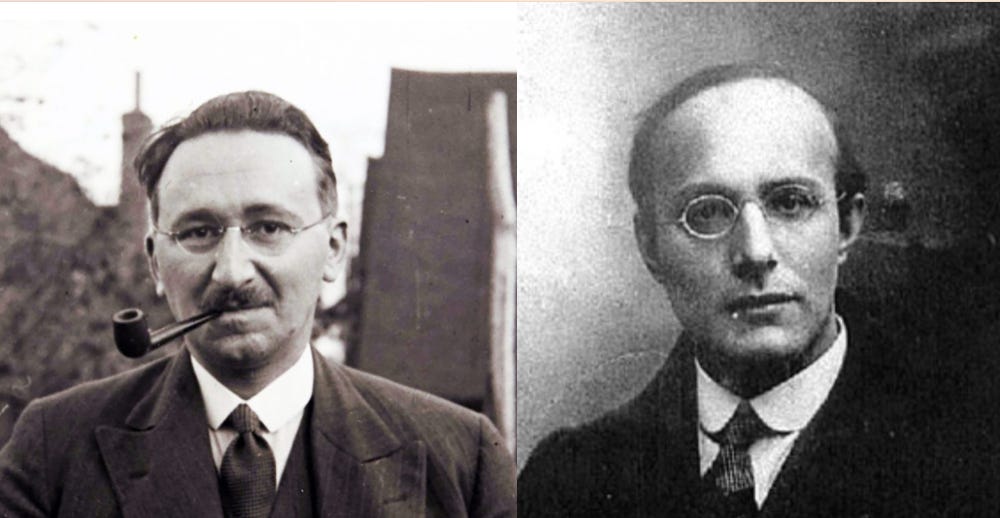

I want to make y'all go read https://www.chelseagreen.com/product/thinking-in-systems/ Donna Meadows' _Thinking in Systems_.
I have the disturbing impression that this is an area of knowledge that hasn't made it into the discussions about the economy and social organization.
If not the problem, certainly a problem, is that the market functions as an excuse; the actual purpose is to guarantee wealth. Everything else is a rationalization, and there's a sharp limit on the utility of refuting rationalizations.